Baby Done, a dryly hilarious 2020 comedy from Kiwi husband-and-wife director Curtis Vowell and writer Sophie Henderson, opens by showing us its protagonist, Zoe (Rose Matafeo), as she sees herself.
‘I’m a leader; I’m a soldier; I’m an animal with supernatural powers,’ raps Wild Belle’s Natalie Bergman on the soundtrack as Zoe clips on a harness, straps on a helmet, nimbly climbs an enormous conifer tree and begins chainsawing off one of its branches. Her English boyfriend, Tim (Matthew Lewis), stands outside the designated branch-drop zone, also wearing an arborist’s safety gear. He looks anxiously up at Zoe and frets that she’s chainsawing one-handed. ‘You try and get it any other way!’ she retorts.
Their dynamic is set: she’s bold and physically confident; he’s cautious and emotionally labile. (He can’t help crying sympathetically whenever Zoe does.) But he’s also her champion: he proudly tells their apprentice Sonny (Matenga Ashby) that Zoe’s about to compete in the National Tree Climbing Championships.
As she and Tim attend yet another elaborate baby shower – where all the food and drinks are baby-themed, and everyone either has a baby, is having a baby or is a baby – Zoe reiterates the stages of social capitulation to her similarly fancy-free friend Molly (Emily Barclay): ‘Married, house, baby, done.’
But she’s reluctant to announce, or even accept, that it’s happening to her. Zoe’s pregnant. And as the clinic nurse (Kura Forrester) – the first in a cheerfully tyrannical series of maternal-health practitioners she will encounter – lists all the things she’s no longer allowed to do, Zoe’s life so far flashes before her eyes, and it dawns on her that she hasn’t done nearly as much with it as she’d hoped.

Throughout the film, Zoe struggles with matrescence, or the psychological transition to motherhood.[1]See Alexandra Sacks, ‘Matrescence: The Developmental Transition to Motherhood’, Psychology Today, 8 April 2019, <https://www.psychologytoday.com/nz/blog/motherhood-unfiltered/201904/matrescence-the-developmental-transition-motherhood>, accessed 3 November 2020. ‘I want to have a baby,’ she says. ‘I just don’t want to turn into a mum.’ Like someone facing a terminal diagnosis, Zoe is determined to seize life in the precious few months before motherhood inevitably snatches it away. And the film’s challenging proposition is that she is within reason to fear for her autonomy.
Parenthood vs kidulthood
Baby Done was marketed using the tagline ‘Growing a baby doesn’t mean growing up’[2]Madman Entertainment, Baby Done press kit, 2020, p. 2. – which flags its genre as a ‘kidult’ film. Hollywood studio comedies in this vein depict childish adults as aimless, pleasure-seeking solipsists. A male protagonist is a ‘manchild’;[3]See Mel Campbell, ‘Dawn of the Dad: Masculinity and Maturity in Abe Forsythe’s Little Monsters’, Metro, no. 203, 2020, pp. 20–5. his female equivalent is a ‘girl gone wild’ or ‘woman behaving badly’.[4]See Mel Campbell, ‘Maid of Dishonour: Women Behaving Badly in Bridesmaids’, Screen Education, no. 95, 2019, pp. 118–23.
Such films invite audiences to vicariously enjoy pratfalls, sexual misunderstandings and bodily functions precisely because ‘gross-out’ antics are framed as juvenile: something the characters will outgrow. This cultural logic allows only one route to respectable adulthood: bearing or caring for a child, rather than just acting like one.
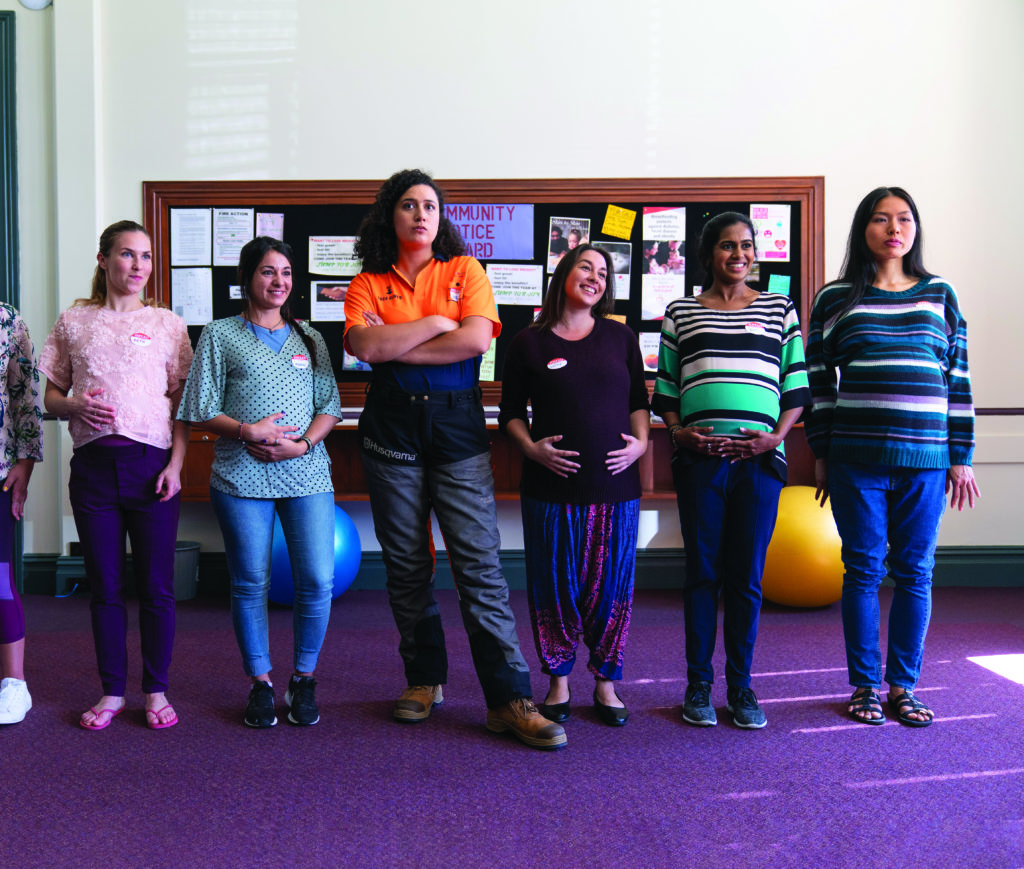
Baby Done initially feints in this raucous direction. Tim and Zoe mock gender-reveal ceremonies, mime public sex when it’s suggested they have a baby, then crush all comers in baby-shower parlour games. They’re young and fun! They’ll never knuckle under and become brain-dead parents!
But, ultimately, this is a gentle, affable comedy that feels true to life because it seeks its humour in everyday interactions. Henderson wrote the script during her own pregnancy, and it sings with little observational moments of alienation as a reluctant Zoe fights the baby cult all the way to the delivery room. She is genuinely shocked when confronted by an actual toddler, can’t immediately remember her due date and sarcastically extemporises a bombastic ‘birth plan’ during a prenatal consultation: fireworks outside the hospital; Tim ‘making an effort’ by wearing a suit; and a glitter bomb celebrating the birth. A subtler but even more astute observation in the script is that Zoe and Tim repeatedly correct platitudes such as ‘before baby arrives’ to ‘before the baby arrives’. You can just tell this bugged the hell out of Henderson.
‘I’m a wild person – we’re wild people! We should do something wild!’ says Zoe desperately to Tim, who agrees just as desperately. But she and Tim are not, in fact, very wild. His biggest dream is to abandon dishwashing and eat off disposable plates. Meanwhile, Zoe just yearns to travel. ‘Fuck, I wish I had, like, twenty leather bracelets,’ she says longingly, eyeing the carefree young backpackers in the hostel where she and Tim are staying during her tree-climbing competition.
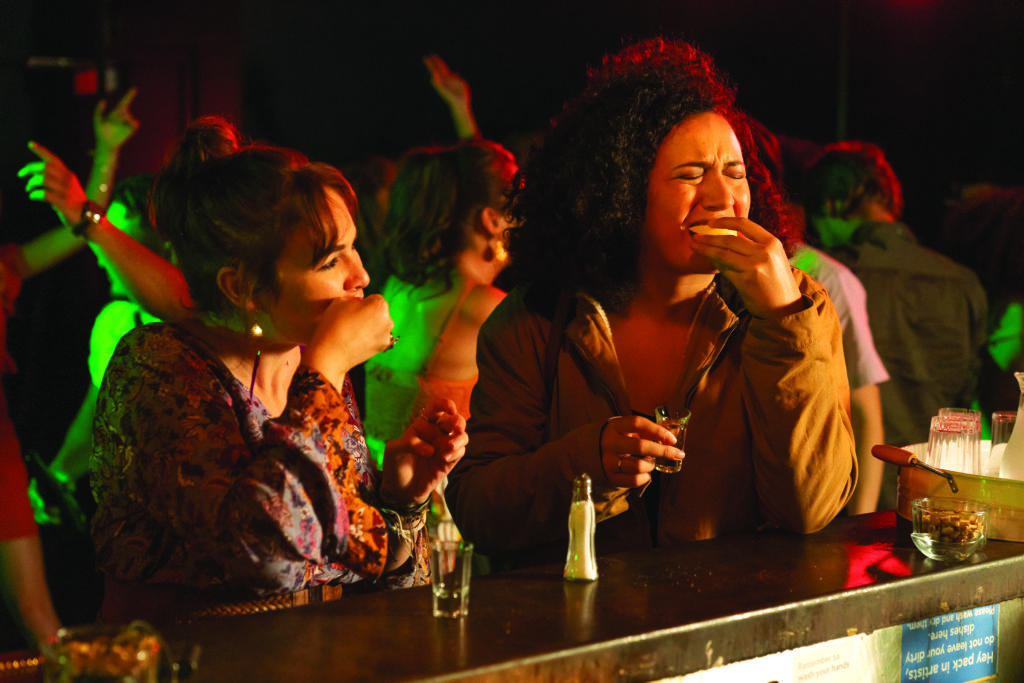
The ‘bucket list’ of pre-parenting debauchery she draws up with Tim – partying, drugs and a threesome with Molly – only leaves them both uncomfortable and humiliated. But there’s one bucket-list item Zoe refuses to give up: the World Tree Climbing Masters in Canada. And to nearly everyone around her, this makes Zoe a ‘kidult’. Tim, Zoe’s parents (Loren Taylor and Fasitua Amosa) and healthcare workers all tell her she’s being silly and irresponsible. ‘There’s something called pregnancy negation,’ says one midwife (Hayley Sproull). Even the free-spirited Molly tells her, ‘You’re a baby having a baby.’
Matafeo, a popular New Zealand stand-up and sketch comedian, felt her character was acting cartoonishly. ‘I think the concept of having a bucket list before something like that happens […] is a bit foolish,’ she told an interviewer. ‘Your life doesn’t end. It just changes. It fundamentally changes but you still go on living.’[5]Rose Matafeo, quoted in Karl Puschmann, ‘Rose Matafeo on Her New Film Baby Done & Being Her Own Harshest Critic’, Viva, 22 October 2020, <https://www.viva.co.nz/article/culture-travel/rose-matafeo-reflects-on-her-comedy-career-upon-her-new-film-release/>, accessed 3 November 2020.
Like someone facing a terminal diagnosis, Zoe is determined to seize life in the precious few months before motherhood inevitably snatches it away. And the film’s challenging proposition is that she is within reason to fear for her autonomy.
Zoe’s life may be changing, but she doesn’t really need to do any growing up. She and her long-term partner already share a dog and run a business. Zoe even cares that Sonny (a pointedly named character) has been kicked out of high school. A baby won’t ‘complete’ her – and, quite reasonably, she’s reluctant to taint motherhood with resentment at her own lost opportunities: ‘I don’t want to hate my baby and become just another mum.’
In one of the film’s funniest sequences, Zoe blows off her antenatal class to meet with Sonny’s school principal (Rachel House), pretending to be his mum so she can convince the school not to expel him. Abandoning her usual practical jeans and boots for a demure, high-necked floral frock and a beige cardigan decorously knotted around her shoulders and cradling her belly with decorous ostentation, she begins the conversation in a somnolent voice of imagined maternal authority: ‘Sorry it has taken us so long to speak to each other, but, as you can see, I am … heavy with young.’ She fails to convince the principal, of course, who knows exactly who Zoe is. But while Zoe may despise the trappings of motherhood – and the feeling of being trapped – she shows up for Sonny when it matters.
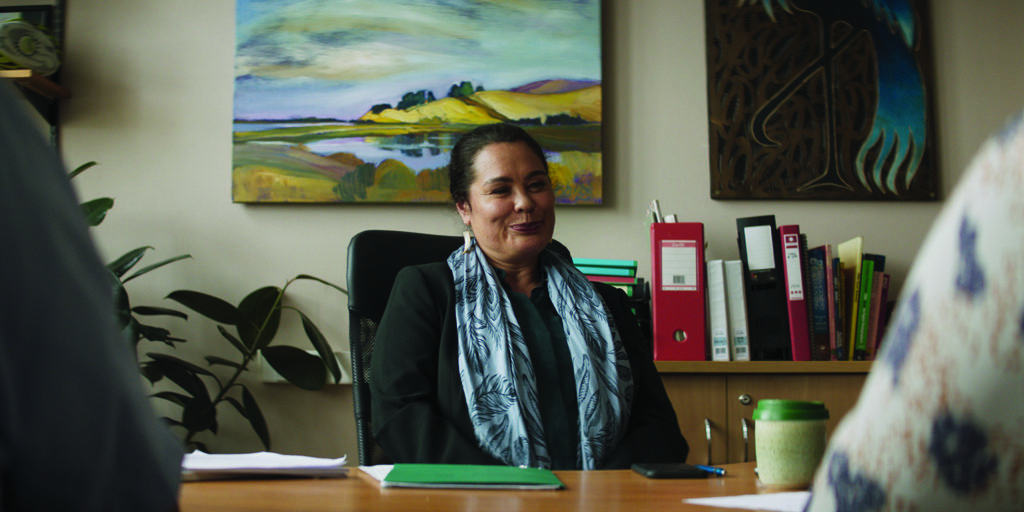
Birth of a more satisfying romance
Baby Done is a surprisingly shrewd satire of the way pregnancy robs women of their agency. It’s also a surprisingly satisfying, character-driven romantic comedy about long-term lovers pushed in different directions who must compromise to reconcile. Matafeo and Lewis – who will be best known to audiences as Neville Longbottom in the Harry Potter (2001–2011) films – have a charming, relatable chemistry, like people you might know in real life. You wish they were your friends, and want things to work out for them.
At the film’s outset, Tim and Zoe seem content, but are really complacent; the pregnancy teases out their unresolved tensions. Zoe wants adventure, but Tim wants security. Her physical bravado exasperates rather than thrills him; while she feels trapped, rather than supported, by his fussing. ‘I’ll do what I like, actually,’ she tells him at one point, with unexpected bite in her voice.
But while Zoe grew up with parents who encouraged her independence and assured her she was wanted – ‘You weren’t an accident!’ is their refrain – Tim had a deadbeat father and is determined to be there for his own child. When they’re at the beach walking their dog Bear, Tim keeps needling her – ‘I know you hate being pregnant! I wish I could do it for you, because you are fucking so bad at it!’ – until she retaliates, cruelly: ‘You think you’re going to be such a good dad, but you’re not. Dads turn into their dads.’ In the car, they break up. Zoe sobs; but, for the first time, Tim remains dry-eyed.
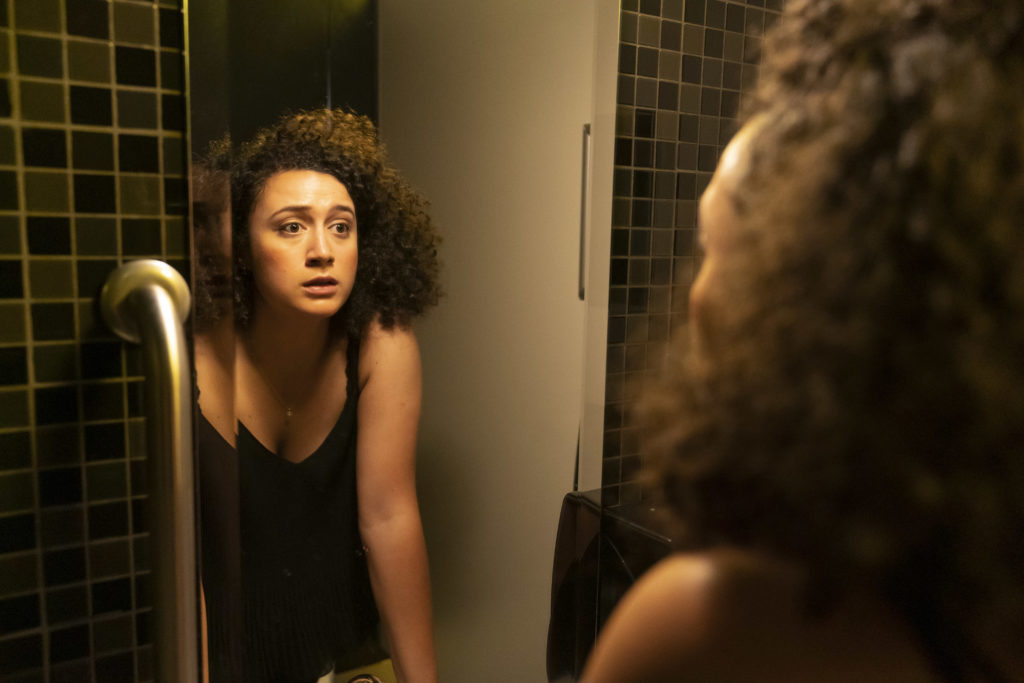
Films about pregnancy are not always about matrescence. Instead, they echo broader cultural sentiments that the meaning of a pregnancy is purely the baby it will produce: a gift bred for others. In a 2018 opinion article in New Zealand lifestyle website Stuff, grimly headlined ‘Hello Baby, Goodbye Me’, Rose Hoare remembers her realisation, about halfway through her pregnancy, ‘that I had basically ceased to matter, both to the world and to myself, and that it would probably always be this way from now on’.[6]Rose Hoare, ‘Hello Baby, Goodbye Me: When Motherhood Sparks an Identity Crisis’, Stuff, 3 August 2018, <https://www.stuff.co.nz/life-style/parenting/baby/106005307/hello-baby-goodbye-me-when-motherhood-sparks-an-identity-crisis>, accessed 3 November 2020.
The first few comments on the article are from men demanding their experience as new fathers be recognised as ‘patrescence’. But it already is: many pregnancy films – from the melodramatic She’s Having a Baby (John Hughes, 1988) and the slapstick Nine Months (Chris Columbus, 1995) to the ribald Knocked Up (Judd Apatow, 2007) – have focused on the expectant father. Junior (Ivan Reitman, 1994) even parodies antenatal paternalism by having Arnold Schwarzenegger’s Alex live out Tim’s wish in Baby Done to be pregnant himself.
Zoe’s terror of losing herself may be heightened for laughs, but Baby Done never treats it as a delusion. Instead, it’s a completely reasonable response to a society that seeks to tie women down instead of celebrating how high they can climb.
By contrast, Baby Done is refreshing in its insistence on the integrity of Zoe’s autonomous, pre-pregnancy self. After her break-up, she’s appalled to discover that Tim seems to have taken up with Beth (Olivia Tennet), a single woman in the antenatal class. For Zoe, this only confirms that Tim ‘just found someone else to be a dad with’, so she bans him from being present when she gives birth.
She, in turn, has used a dating site to meet Brian (Nic Sampson), a ‘preggophile’ who’s turned on by the taboo of treating pregnant women as sexual beings. Brian’s fetish is played for laughs – he seductively plaster-casts Zoe’s torso to add to the collection on display in his apartment – but he’s also the only character who cherishes her, and not the baby.
Just as Baby Done’s first act toys with the hedonistic tropes of the kidult film, its final act pivots on the grand gestures of love that fuel the romantic comedy. One of these is the ‘race for love’, in which a character hurries to declare their true feelings before their lover leaves forever.[7]See ‘Race for Your Love’, TV Tropes, <https://tvtropes.org/pmwiki/pmwiki.php/Main/RaceForYourLove>, accessed 3 November 2020. In Baby Done, Tim has an epiphany after encountering a stranger, who responds to his confused tale of Zoe and Beth with the observation: ‘You’re running in the wrong direction.’
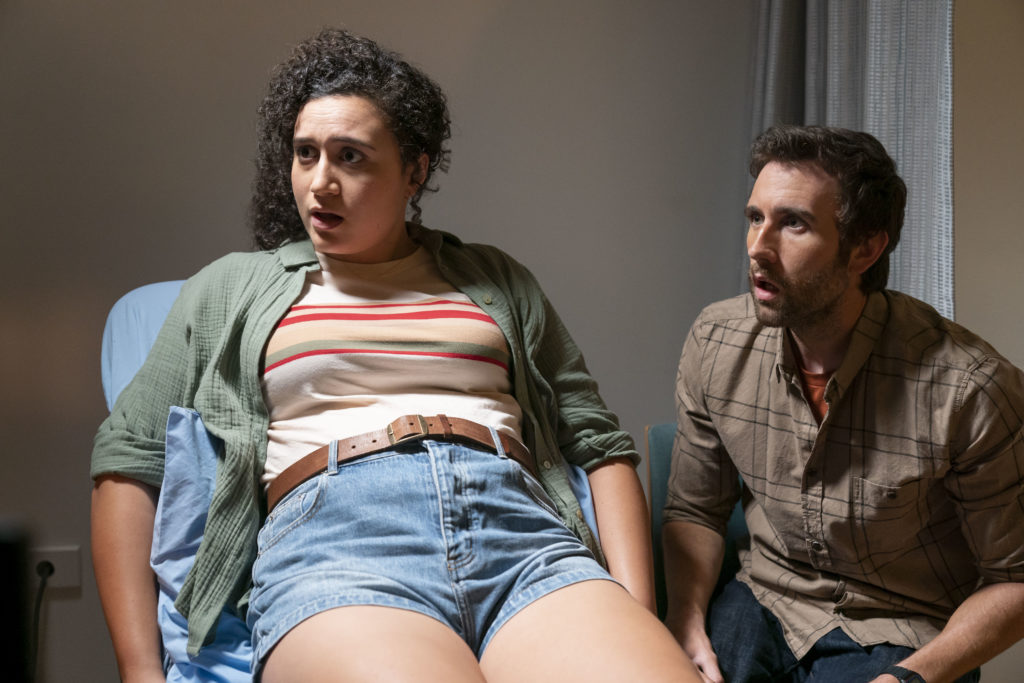
Because we know Zoe is heading to the airport, still determined to get to Canada despite actually being in labour, we expect the traditional rom-com ‘run to the departure gate’ … but, instead, their paths misalign once more: Tim shows up outside Zoe’s darkened, empty bedroom, while Zoe has been taken to hospital. She’s insisting to the laconic midwife (Madeleine Sami) through gritted teeth that she enjoys solitude and is experiencing a pain level of −1 on a scale from 1 to 10.
Then, through the window, she sees fireworks – one of the elaborate gestures she’d sarcastically demanded of Tim during her earlier ‘birth plan’ rant. Moved, she unfolds the slip of paper on which the sonographer had written her baby’s gender … and she’s overcome as the reality of her situation hits home for the first time. Sobbing, she calls Tim, unaware that he’s right outside: ‘I’ve forgotten how to be me, and I think I need you to remind me.’
Zoe’s terror of losing herself may be heightened for laughs, but Baby Done never treats it as a delusion. Instead, it’s a completely reasonable response to a society that seeks to tie women down instead of celebrating how high they can climb. And what makes Baby Done so satisfying is that Zoe and Tim both learn to adjust their rigid expectations. Unlike its title, it’s not a zero-sum game.
The film’s final scene emphasises the strength of compromise by mirroring the opening one: Zoe climbs a tree while Tim waits below. No longer fretful, he dozes contentedly in a hammock with the baby, while Zoe swings acrobatically from tree to tree. ‘You’re not even looking,’ she chides them playfully. But, in the moment, she’s happy just to be herself.
Endnotes
| 1 | See Alexandra Sacks, ‘Matrescence: The Developmental Transition to Motherhood’, Psychology Today, 8 April 2019, <https://www.psychologytoday.com/nz/blog/motherhood-unfiltered/201904/matrescence-the-developmental-transition-motherhood>, accessed 3 November 2020. |
|---|---|
| 2 | Madman Entertainment, Baby Done press kit, 2020, p. 2. |
| 3 | See Mel Campbell, ‘Dawn of the Dad: Masculinity and Maturity in Abe Forsythe’s Little Monsters’, Metro, no. 203, 2020, pp. 20–5. |
| 4 | See Mel Campbell, ‘Maid of Dishonour: Women Behaving Badly in Bridesmaids’, Screen Education, no. 95, 2019, pp. 118–23. |
| 5 | Rose Matafeo, quoted in Karl Puschmann, ‘Rose Matafeo on Her New Film Baby Done & Being Her Own Harshest Critic’, Viva, 22 October 2020, <https://www.viva.co.nz/article/culture-travel/rose-matafeo-reflects-on-her-comedy-career-upon-her-new-film-release/>, accessed 3 November 2020. |
| 6 | Rose Hoare, ‘Hello Baby, Goodbye Me: When Motherhood Sparks an Identity Crisis’, Stuff, 3 August 2018, <https://www.stuff.co.nz/life-style/parenting/baby/106005307/hello-baby-goodbye-me-when-motherhood-sparks-an-identity-crisis>, accessed 3 November 2020. |
| 7 | See ‘Race for Your Love’, TV Tropes, <https://tvtropes.org/pmwiki/pmwiki.php/Main/RaceForYourLove>, accessed 3 November 2020. |





